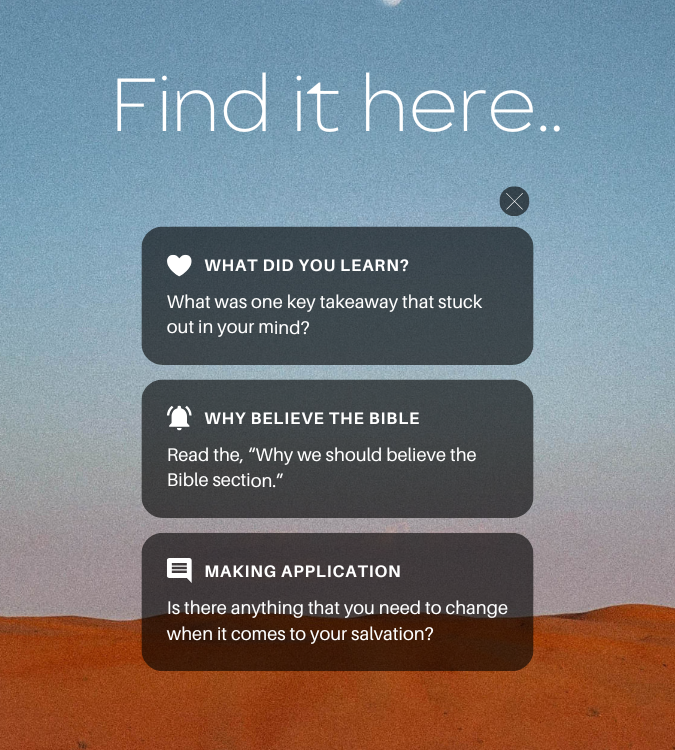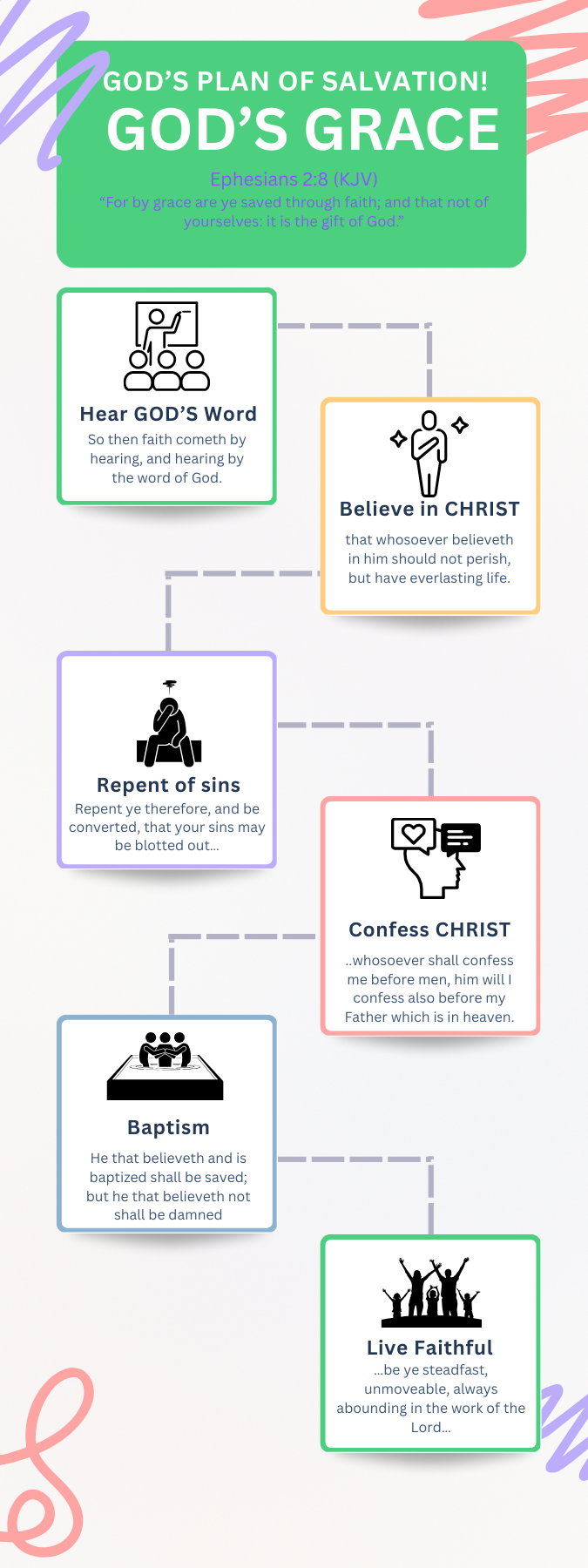What We Learn from the Video
Have you ever chased a spiritual high, thinking it sealed your salvation? This video shatters that notion. True change comes from Scripture, not just tears. In plain language, the main message is that emotions alone don't save—obedience to God's Word does.
The speaker describes a youth event full of crying and prayer. It felt real. But Acts 2:38 revealed the gap: repentance and baptism for forgiveness. Why keep reading? Because this could steady your faith too.
As the script states: "My feeling wasn't enough. I obeyed the gospel fully and now I know, not feel, that I've been saved according to God's word." Isn't that freeing?
Why It Matters Today
The video stresses the Bible plan of salvation over subjective experiences. Feelings fade, but God's steps endure. Explore the truth about baptism—it's essential, not optional.
Imagine the certainty of knowing you're saved. The speaker's story persuades: Move from fleeting highs to lasting obedience. What if your spiritual journey needs this shift? It's a compelling call to action.
Why We Should Believe the Bible
Evidence of Reliability
Why trust the Bible amid doubts? Its trustworthiness of Scripture shines through proven facts. Let's break it down.
Fulfilled prophecy sets it apart. Over 300 predictions about Jesus, like Micah 5:2 on His birthplace, came true. Short and direct: This shows divine insight. Can humans predict centuries ahead? No—God can.
Historical accuracy backs it up. Archaeology confirms sites like Jericho. Varied accounts? They match real history.
Eyewitness and Inspiration
Eyewitness testimony adds power. Apostles saw it all. As 2 Peter 1:16 says, "We were eyewitnesses of His majesty." Reliable like court evidence.
Divine inspiration unifies it. 2 Timothy 3:16 declares, "All Scripture is given by inspiration of God." In the video, Acts 2:38 guides: "Repent... for the forgiveness of sins." God’s Word is truth—clear and corrective.
Why not rely on feelings? The Bible endures scrutiny.
Embrace It as Authority
View the Bible as the authority of the Bible. It corrects emotions, as the speaker learned. Encourage this: Study daily. Ask yourself—does it shape your life?
- Prophecy: Proves foreknowledge.
- History: Verifies events.
- Testimony: Builds credibility.
- Inspiration: Ensures unity.
Trust it for guidance. It's persuasive, factual, eternal.
How to Apply This Truth to My Life
Action Steps for Obedience
The video urges moving beyond feelings. Here are four steps for applying God’s Word. Start simple.
First, examine your experience. Read Acts 2:38. Did emotions lead to repentance? If not, act now.
Second, obey fully. Pursue baptism if missing. The script says: "I obeyed the gospel fully." Short step: Find a Bible group.
Third, build Word-based habits. Journal Scriptures daily. Replace feelings with truth. Varied approach: Mix prayer and study.
Fourth, share openly. Tell your story. This fosters Christian living through accountability.
These imply obedience to the gospel. Why wait? They transform doubt into certainty.
A Modern Scenario
Picture Emily, stressed in college. She felt "saved" at a worship event. But emptiness lingered. Applying this? She studied Acts 2:38, repented distractions, confessed, and baptized.
Outcome? Stability replaced highs and lows. Now she leads studies, purposeful and peaceful. Obedience changes everything. Isn't that inspiring?
Make It Personal
Implement these today. Set goals: Weekly reading, community talks. The speaker's shift proves it—knowing trumps feeling.
Your life can reflect true Christian living. Engage now. What holds you back? Embrace obedience for real growth.
What This Denomination Teaches about Salvation
Overview of Teachings
Many evangelical and charismatic groups emphasize emotional experiences in salvation. This denominational view of salvation often centers on a personal "moment" of faith. Is it biblical? Let's explore respectfully.
These teachings highlight faith alone as key. Salvation comes instantly through believing in Jesus, often without required steps like baptism. It's rooted in grace, avoiding works-based ideas. For example, they draw from Ephesians 2:8-9: "By grace you have been saved through faith... not of works."
The video's speaker describes such an experience: "I had a powerful emotional experience at a youth event and thought that was the moment I got saved. I cried, I prayed, I felt different." This captures the focus on feelings as evidence.
Why persuasive? It makes faith accessible. No rituals—just heartfelt response.
Role of the Sinner’s Prayer
A common practice is the sinner’s prayer, a simple confession inviting Jesus into one's heart. It's seen as the turning point, leading to assurance.
Groups like Assemblies of God or non-denominational churches promote this during altar calls. Emotions confirm the change—tears or joy signal the Holy Spirit's work.
Factually, it's respectful to human experiences. The prayer emphasizes Romans 10:9: "Confess with your mouth... and you shall be saved." Short and direct: It's inviting.
Yet, the script notes a shift: The speaker read Acts 2:38 and saw more was needed.
Meaning of Water Baptism
In this view, water baptism meaning is symbolic—an outward sign of inner conversion. It's not essential for salvation but follows as obedience.
Often by immersion, it represents burial with Christ (Romans 6:4). Charismatic traditions may tie it to Spirit baptism, but not forgiveness.
Respectfully, this avoids legalism. Baptism celebrates the emotional decision, not causes it.
Differences from the New Testament
Factually, this differs from New Testament patterns. Acts 2:38 commands: "Repent and be baptized... for the remission of sins." The video highlights this: "But when I read Acts 2.38, I saw something I had missed."
NT examples link baptism to forgiveness immediately (Acts 22:16), not as a later symbol. Faith involves obedience, not just feeling.
- Emotional focus: Can fade, unlike Scripture's certainty.
- Prayer emphasis: Helpful, but not the full command.
- Baptism's role: Symbolic vs. essential.
These views stem from sincere revival histories. Yet, the Bible integrates steps for complete salvation. Study prayerfully—let God's Word guide.
What the Bible Teaches about Salvation
Introduction to God's Plan
Wondering what must I do to be saved? The Bible offers a clear, step-by-step path. This New Testament plan of salvation goes beyond feelings. We'll walk through it in detail, using Scripture.
The video's speaker discovered this via Acts 2:38. Emotions aren't the measure—obedience is. Why detailed? Because your eternity matters. Let's begin.
Practical tip: Read along with your Bible. Each step builds faith persuasively.
Step 1: Hearing the Word
Faith starts here. Romans 10:17 states: "Faith comes by hearing, and hearing by the word of God." Short question: How can you believe without knowing?
This means engaging Scripture. Listen to teachings or read aloud. The video implies this—the speaker "read" Acts 2:38 and saw truth.
Persuasive explanation: Hearing convicts. It challenges emotional highs, revealing gaps. For example, if you've felt saved but ignored commands, hearing corrects.
Practically, set daily time. Use apps for audio Bibles. Varied approach: Discuss with friends. Why urgent? Without hearing, faith stays shallow. Bullet points for application:
- Start with Gospels.
- Join online studies.
- Note convictions.
This step ignites the journey.
Step 2: Believing in Jesus
Next, genuine belief. Mark 16:16: "He who believes and is baptized will be saved." Belief trusts Jesus' death and resurrection.
The script ties to this—feelings felt real, but belief demands more. Is your belief active?
Persuasive: Demons believe facts (James 2:19), but saving belief changes lives. It motivates obedience, not just emotion.
Practical steps: Affirm truths like John 3:16. Examine doubts through prayer. In daily life, let belief shape choices—avoid sin, seek God.
Step 3: Repentance from Sin
Repentance turns from sin. Acts 2:38 commands: "Repent, and be baptized... for the remission of sins." The video quotes this directly.
Why essential? Without it, belief is incomplete. Persuasive: It's a heart shift, bringing freedom.
Practical: List sins, confess in prayer. Change habits—like quitting lies or anger. Example: If pride fueled emotional decisions, repent humbly.
Bullet for persuasion:
- Feels hard? God helps (2 Peter 3:9).
- Results? Joy and renewal.
Step 4: Confession of Faith
Confess openly. Romans 10:9-10: "If you confess with your mouth the Lord Jesus... you will be saved."
The script implies this in obeying fully. Public declaration solidifies belief.
Persuasive: It builds courage. Matthew 10:32—Jesus confesses those who confess Him.
Practical: Share with family or church. Write a testimony. In scenarios like work stress, confession strengthens witness.
Short: Don't hide. Long: This step counters private feelings, fostering community.
Step 5: Baptism for Remission of Sins
Here's the truth about baptism. Acts 2:38 links it to forgiveness; 1 Peter 3:21: "Baptism... now saves you... through the resurrection of Jesus Christ."
The video emphasizes: "Repentance and baptism for the forgiveness of sins." Not a feeling— an act.
Persuasive explanation: It's immersion, burying old self (Romans 6:4). Why? Contacts Christ's blood, washing sins.
Practical: Find a Bible church for it. No delay—like the eunuch in Acts 8.
Bullets:
- Symbolizes death to sin.
- Brings Holy Spirit.
- Essential for new life.
Step 6: Living Faithfully
Endure faithfully. Revelation 2:10: "Be faithful until death, and I will give you the crown of life."
Post-baptism, live it out. The script says: "Now I know, not feel, that I've been saved." Consistency matters.
Persuasive: Trials test, but faithfulness rewards. Hebrews 10:36—endurance brings promise.
Practical: Worship, serve, study. Avoid backsliding through accountability.
Stay committed. Grow daily. Long: This Bible way to be saved ensures eternity, beyond initial steps.
Wrapping Up the Plan
These steps form a complete path. Review: Hear, believe, repent, confess, baptize, live faithfully. The video's journey proves it— from feeling to knowing.
Heartfelt appeal: Don't rely on emotions. God invites you now. Obey His Word for true peace. Your soul awaits—respond today.
Background of the Denomination
Origins and Founders
The teachings in the video often align with Pentecostal traditions. This history of Pentecostal movement began in the early 20th century. What sparked it? Key figures like Charles Parham founded it around 1901 in Topeka, Kansas.
Parham emphasized Spirit baptism with tongues. William J. Seymour advanced it during the Azusa Street Revival in Los Angeles, 1906. This event drew diverse crowds, spreading globally.
Short and factual: Pentecostals emerged from Holiness movements, seeking deeper experiences. Why significant? It tied to salvation views emphasizing emotions.
Core Doctrines and Teachings
Pentecostals stress the Holy Spirit's role. Core doctrines include salvation by faith, often with emotional "altar experiences." Baptism in the Spirit follows, evidenced by gifts like tongues.
The origin of Pentecostal teachings on salvation stems from Wesleyan ideas of sanctification. They view conversion as a felt encounter, leading to assurance.
Is this biblical? Respectfully, it focuses on grace. Yet, historical events like Azusa emphasized feelings over steps like baptism.
Historical Events Tied to Salvation
The Azusa Revival (1906-1915) shaped salvation teachings. Crowds sought emotional outpourings, equating them with being saved. Revivals spread this globally.
Another event: The 1940s Latter Rain movement reinforced experiential faith. These influenced youth events, as in the video's story.
Factually, Pentecostals contributed to missions and worship. Study their history alongside Scripture for balance.
Key Bible Passages to Read and Study
Essential Verses for Understanding
Exploring Bible verses about salvation clarifies true faith. These Scriptures for eternal life tie to the video's focus on Acts 2:38. Why study them? They shift from feelings to obedience. Here's a list of 10, with short explanations. Some direct from script, others relevant.
- Acts 2:38 - "Repent, and let every one of you be baptized in the name of Jesus Christ for the remission of sins."
The video quotes this. It shows repentance and baptism forgive sins—not emotions. - Romans 10:17 - "So then faith comes by hearing, and hearing by the word of God."
Faith begins with Scripture. Short: Hear to believe truly. - Mark 16:16 - "He who believes and is baptized will be saved."
Jesus links belief and baptism. Persuasive: Obey both for salvation. - Romans 10:9-10 - "If you confess with your mouth the Lord Jesus... you will be saved."
Confession affirms belief. Public, not just felt. - 1 Peter 3:21 - "Baptism... now saves you... through the resurrection of Jesus Christ."
Baptism appeals to God. Explains its saving role beyond symbols.
More Key Passages
- Revelation 2:10 - "Be faithful until death, and I will give you the crown of life."
Endurance secures eternity. Long: Live faithfully post-obedience. - John 3:5 - "Unless one is born of water and the Spirit, he cannot enter the kingdom of God."
Ties birth to baptism and Spirit. Counters emotion-only views. - James 2:19 - "Even the demons believe—and tremble!"
Belief without action fails. Relevant to video's theme. - 2 Corinthians 5:17 - "If anyone is in Christ, he is a new creation."
True change is transformation, not fleeting feelings. - Hebrews 5:9 - "He became the author of eternal salvation to all who obey Him."
Salvation for obeyers. Emphasizes action.
How to Study Them
Use these for daily reflection. Bullet tips:
- Read in context.
- Journal insights.
- Discuss with others.
The video's shift proves their power. Study to know, not just feel, salvation.
Common Misunderstandings about Salvation
Misunderstanding 1: Salvation by Feelings Alone
Many think an emotional high equals salvation. Is a "God moment" enough? This stems from revival traditions, equating tears with conversion.
But it's among false teachings about salvation. The video rebuts: "I had a powerful emotional experience... but when I read Acts 2.38, I saw something I had missed."
Correct with Scripture: Jeremiah 17:9 warns, "The heart is deceitful above all things." Feelings deceive; obedience confirms.
Persuasive: Seek certainty in God's Word, not highs that fade.
Misunderstanding 2: Faith Only, No Obedience
Some claim belief saves without actions like repentance. Short: Faith stands alone.
This overlooks misconceptions about grace—grace enables works, not excuses them. James 2:26 corrects: "Faith without works is dead."
The script implies this: Feelings felt saving, but Acts 2:38 demanded more. Why risk it? True faith acts.
Bullet corrections:
- Grace teaches denial of sin (Titus 2:11-12).
- Obey to prove faith.
Misunderstanding 3: Baptism Is Optional or Symbolic
Viewing baptism as a mere symbol after salvation is common. Why not essential?
But the truth about baptism is in Acts 2:38: "Be baptized... for the remission of sins." The video directly: "Repentance and baptism for the forgiveness of sins."
Persuasive explanation: It's the moment sins wash away (Acts 22:16). Don't delay—obey as NT converts did.
Misunderstanding 4: Saved Before or Without Baptism
People say salvation happens at belief, with baptism later. Long: Instant via prayer.
This error separates what Scripture joins. Mark 16:16: "He who believes and is baptized will be saved."
Script rebuttal: The speaker thought feelings saved, but realized: "My feeling wasn't enough." Factually, NT patterns show immediate baptism.
Misunderstanding 5: Universalism—All Are Saved Regardless
Universalism claims God's love saves everyone, no steps needed. Even without response?
Correct with John 3:18: "He who does not believe is condemned already." The video's journey shows personal obedience matters.
Persuasive: God's invitation requires action. Avoid this by studying full truth.
Real-Life Examples of Changed Lives
Testimony 1: From Emotional High to Solid Faith
Meet Jordan, who shares a Christian testimony like the video's. At a camp, he felt an intense rush during worship—tears, prayers, a "saved" moment. But doubts crept in. Life stayed chaotic with old habits.
Inspired by Acts 2:38, he studied. Short question: Was feeling enough? No. He repented, confessed, and was baptized for forgiveness.
Change? Peace replaced anxiety. Now he volunteers, his marriage strengthened. Obedience brought certainty.
Testimony 2: A Family's Transformation
Lisa's story echoes the script. She "got saved" at a revival, feeling transformed. Yet, emptiness lingered amid family strife. Why no lasting joy?
Reading Acts 2:38 revealed: "Repentance and baptism for the forgiveness of sins." She obeyed fully—repented neglect, confessed Christ, immersed.
Outcome? Her home healed; kids followed suit. It's a changed life through the gospel, from fleeting emotions to enduring commitment.
Simple steps. Profound results. Bullet impacts:
- Renewed purpose.
- Community support.
- Biblical assurance.
Imagine the heartfelt relief of knowing, not just feeling, God's forgiveness—as the video so powerfully reminds us.
Why Urgency Matters in Responding to the Gospel
The Fragility of Tomorrow
Life can change instantly—why risk delay? This urgency of salvation is biblical. James 4:14 warns: "You do not know what will happen tomorrow. For what is your life? It is even a vapor that appears for a little time and then vanishes away."
The video implies this: The speaker didn't wait after reading Acts 2:38. Feelings fade; obedience lasts. Short: Act now.
Persuasive: Procrastination hardens hearts. Have you postponed? Eternity awaits no one.
Seize the Moment
Scripture calls: 2 Corinthians 6:2 states, "Behold, now is the accepted time; behold, today is the day of salvation." God's offer is now.
The script appeals indirectly: "My feeling wasn't enough. I obeyed the gospel fully." Why delay? Emotions deceive, but truth endures.
Practical: Hear, believe, repent today. Bullet reasons:
- Accidents happen.
- Opportunities pass.
- Judgment comes (Hebrews 9:27).
Long: Delaying risks missing forgiveness, as NT urgency shows.
Dangers of Postponing Obedience
Do not delay obeying the gospel—it's perilous. Many plan later, but distractions mount. The video's youth event felt saving, yet Scripture demanded immediate response.
Reference Acts 2:38: Repent and baptize without wait. Persuasive explanation: Delay invites regret; obey for peace.
Ready? Action: Step forward. Examples like the jailer (Acts 16) baptized at once.
Biblical and Practical Appeals
Urgency protects your soul. Proverbs 27:1: "Do not boast about tomorrow." The speaker's shift proves: One realization changed everything.
In daily life, apply by studying now. Why wait for crisis? God's grace invites immediate obedience.
Heartfelt: Respond today—your eternal peace depends on it.
Questions to Ask Yourself After Watching
Reflective Questions on Faith
The video challenges emotion-based faith. Use these 6 questions to examine your eternal destiny. They tie to Acts 2:38. Ponder honestly.
- Am I saved by feelings alone? The script says: "I had a powerful emotional experience... but my feeling wasn't enough." Does yours align with Scripture?
- Have I truly repented? Acts 2:38 commands it. Short: Turned from sin? Or excused habits?
- What role does confession play? Romans 10:9 urges public declaration. Is mine heartfelt and open?
- Was baptism part of my response? The video highlights: "Repentance and baptism for the forgiveness of sins." Varied: Essential or overlooked?
- Do I know or just feel saved? The speaker shifted to: "Now I know, not feel." Question: Biblical certainty?
- Am I following the Bible truth about salvation? Examine steps—hearing, believing, living faithfully. Man's way or God's?
How to Use These Questions
Journal answers prayerfully. Bullet tips:
- Compare to Scripture.
- Discuss with a mentor.
- Act on insights.
These encourage growth, as the video persuades. Your honest reflection leads to true assurance.
Next Steps for Learning More
Take Action Today
Moved by the video? Don't stop here. Join a free Bible study on AreUSaved.com. It's simple and scriptural.
These sessions explore Acts 2:38, shifting from feelings to obedience. Short: Sign up online. Varied: Why? Deepen understanding.
Practical: Weekly virtual groups, no cost. Tie to script: Learn repentance and baptism fully.
Explore Resources
Read more articles on the site. Topics like "Beyond Emotions" clarify steps. Persuasive: Build knowledge at your pace.
Learn how to be saved through detailed guides. Bullet actions:
- Browse salvation series.
- Watch related videos.
- Download study tools.
Connect Personally
Contact us via the AreUSaved.com chatbot. Ask questions 24/7— like "Explain Acts 2:38." Instant, Bible-based responses.
Or use the contact page for emails/calls. Trained helpers guide respectfully.
What We Learn from the Video
Have you ever chased a spiritual high, thinking it sealed your salvation? This video shatters that notion. True change comes from Scripture, not just tears. In plain language, the main message is that emotions alone don't save—obedience to God's Word does.
The speaker describes a youth event full of crying and prayer. It felt real. But Acts 2:38 revealed the gap: repentance and baptism for forgiveness. Why keep reading? Because this could steady your faith too.
As the script states: "My feeling wasn't enough. I obeyed the gospel fully and now I know, not feel, that I've been saved according to God's word." Isn't that freeing?
Why It Matters Today
The video stresses the Bible plan of salvation over subjective experiences. Feelings fade, but God's steps endure. Explore the truth about baptism—it's essential, not optional.
Imagine the certainty of knowing you're saved. The speaker's story persuades: Move from fleeting highs to lasting obedience. What if your spiritual journey needs this shift? It's a compelling call to action.
Why We Should Believe the Bible
Evidence of Reliability
Why trust the Bible amid doubts? Its trustworthiness of Scripture shines through proven facts. Let's break it down.
Fulfilled prophecy sets it apart. Over 300 predictions about Jesus, like Micah 5:2 on His birthplace, came true. Short and direct: This shows divine insight. Can humans predict centuries ahead? No—God can.
Historical accuracy backs it up. Archaeology confirms sites like Jericho. Varied accounts? They match real history.
Eyewitness and Inspiration
Eyewitness testimony adds power. Apostles saw it all. As 2 Peter 1:16 says, "We were eyewitnesses of His majesty." Reliable like court evidence.
Divine inspiration unifies it. 2 Timothy 3:16 declares, "All Scripture is given by inspiration of God." In the video, Acts 2:38 guides: "Repent... for the forgiveness of sins." God’s Word is truth—clear and corrective.
Why not rely on feelings? The Bible endures scrutiny.
Embrace It as Authority
View the Bible as the authority of the Bible. It corrects emotions, as the speaker learned. Encourage this: Study daily. Ask yourself—does it shape your life?
- Prophecy: Proves foreknowledge.
- History: Verifies events.
- Testimony: Builds credibility.
- Inspiration: Ensures unity.
Trust it for guidance. It's persuasive, factual, eternal.
How to Apply This Truth to My Life
Action Steps for Obedience
The video urges moving beyond feelings. Here are four steps for applying God’s Word. Start simple.
First, examine your experience. Read Acts 2:38. Did emotions lead to repentance? If not, act now.
Second, obey fully. Pursue baptism if missing. The script says: "I obeyed the gospel fully." Short step: Find a Bible group.
Third, build Word-based habits. Journal Scriptures daily. Replace feelings with truth. Varied approach: Mix prayer and study.
Fourth, share openly. Tell your story. This fosters Christian living through accountability.
These imply obedience to the gospel. Why wait? They transform doubt into certainty.
A Modern Scenario
Picture Emily, stressed in college. She felt "saved" at a worship event. But emptiness lingered. Applying this? She studied Acts 2:38, repented distractions, confessed, and baptized.
Outcome? Stability replaced highs and lows. Now she leads studies, purposeful and peaceful. Obedience changes everything. Isn't that inspiring?
Make It Personal
Implement these today. Set goals: Weekly reading, community talks. The speaker's shift proves it—knowing trumps feeling.
Your life can reflect true Christian living. Engage now. What holds you back? Embrace obedience for real growth.
What This Denomination Teaches about Salvation
Overview of Teachings
Many evangelical and charismatic groups emphasize emotional experiences in salvation. This denominational view of salvation often centers on a personal "moment" of faith. Is it biblical? Let's explore respectfully.
These teachings highlight faith alone as key. Salvation comes instantly through believing in Jesus, often without required steps like baptism. It's rooted in grace, avoiding works-based ideas. For example, they draw from Ephesians 2:8-9: "By grace you have been saved through faith... not of works."
The video's speaker describes such an experience: "I had a powerful emotional experience at a youth event and thought that was the moment I got saved. I cried, I prayed, I felt different." This captures the focus on feelings as evidence.
Why persuasive? It makes faith accessible. No rituals—just heartfelt response.
Role of the Sinner’s Prayer
A common practice is the sinner’s prayer, a simple confession inviting Jesus into one's heart. It's seen as the turning point, leading to assurance.
Groups like Assemblies of God or non-denominational churches promote this during altar calls. Emotions confirm the change—tears or joy signal the Holy Spirit's work.
Factually, it's respectful to human experiences. The prayer emphasizes Romans 10:9: "Confess with your mouth... and you shall be saved." Short and direct: It's inviting.
Yet, the script notes a shift: The speaker read Acts 2:38 and saw more was needed.
Meaning of Water Baptism
In this view, water baptism meaning is symbolic—an outward sign of inner conversion. It's not essential for salvation but follows as obedience.
Often by immersion, it represents burial with Christ (Romans 6:4). Charismatic traditions may tie it to Spirit baptism, but not forgiveness.
Respectfully, this avoids legalism. Baptism celebrates the emotional decision, not causes it.
Differences from the New Testament
Factually, this differs from New Testament patterns. Acts 2:38 commands: "Repent and be baptized... for the remission of sins." The video highlights this: "But when I read Acts 2.38, I saw something I had missed."
NT examples link baptism to forgiveness immediately (Acts 22:16), not as a later symbol. Faith involves obedience, not just feeling.
- Emotional focus: Can fade, unlike Scripture's certainty.
- Prayer emphasis: Helpful, but not the full command.
- Baptism's role: Symbolic vs. essential.
These views stem from sincere revival histories. Yet, the Bible integrates steps for complete salvation. Study prayerfully—let God's Word guide.
What the Bible Teaches about Salvation
Introduction to God's Plan
Wondering what must I do to be saved? The Bible offers a clear, step-by-step path. This New Testament plan of salvation goes beyond feelings. We'll walk through it in detail, using Scripture.
The video's speaker discovered this via Acts 2:38. Emotions aren't the measure—obedience is. Why detailed? Because your eternity matters. Let's begin.
Practical tip: Read along with your Bible. Each step builds faith persuasively.
Step 1: Hearing the Word
Faith starts here. Romans 10:17 states: "Faith comes by hearing, and hearing by the word of God." Short question: How can you believe without knowing?
This means engaging Scripture. Listen to teachings or read aloud. The video implies this—the speaker "read" Acts 2:38 and saw truth.
Persuasive explanation: Hearing convicts. It challenges emotional highs, revealing gaps. For example, if you've felt saved but ignored commands, hearing corrects.
Practically, set daily time. Use apps for audio Bibles. Varied approach: Discuss with friends. Why urgent? Without hearing, faith stays shallow. Bullet points for application:
- Start with Gospels.
- Join online studies.
- Note convictions.
This step ignites the journey.
Step 2: Believing in Jesus
Next, genuine belief. Mark 16:16: "He who believes and is baptized will be saved." Belief trusts Jesus' death and resurrection.
The script ties to this—feelings felt real, but belief demands more. Is your belief active?
Persuasive: Demons believe facts (James 2:19), but saving belief changes lives. It motivates obedience, not just emotion.
Practical steps: Affirm truths like John 3:16. Examine doubts through prayer. In daily life, let belief shape choices—avoid sin, seek God.
Step 3: Repentance from Sin
Repentance turns from sin. Acts 2:38 commands: "Repent, and be baptized... for the remission of sins." The video quotes this directly.
Why essential? Without it, belief is incomplete. Persuasive: It's a heart shift, bringing freedom.
Practical: List sins, confess in prayer. Change habits—like quitting lies or anger. Example: If pride fueled emotional decisions, repent humbly.
Bullet for persuasion:
- Feels hard? God helps (2 Peter 3:9).
- Results? Joy and renewal.
Step 4: Confession of Faith
Confess openly. Romans 10:9-10: "If you confess with your mouth the Lord Jesus... you will be saved."
The script implies this in obeying fully. Public declaration solidifies belief.
Persuasive: It builds courage. Matthew 10:32—Jesus confesses those who confess Him.
Practical: Share with family or church. Write a testimony. In scenarios like work stress, confession strengthens witness.
Short: Don't hide. Long: This step counters private feelings, fostering community.
Step 5: Baptism for Remission of Sins
Here's the truth about baptism. Acts 2:38 links it to forgiveness; 1 Peter 3:21: "Baptism... now saves you... through the resurrection of Jesus Christ."
The video emphasizes: "Repentance and baptism for the forgiveness of sins." Not a feeling— an act.
Persuasive explanation: It's immersion, burying old self (Romans 6:4). Why? Contacts Christ's blood, washing sins.
Practical: Find a Bible church for it. No delay—like the eunuch in Acts 8.
Bullets:
- Symbolizes death to sin.
- Brings Holy Spirit.
- Essential for new life.
Step 6: Living Faithfully
Endure faithfully. Revelation 2:10: "Be faithful until death, and I will give you the crown of life."
Post-baptism, live it out. The script says: "Now I know, not feel, that I've been saved." Consistency matters.
Persuasive: Trials test, but faithfulness rewards. Hebrews 10:36—endurance brings promise.
Practical: Worship, serve, study. Avoid backsliding through accountability.
Stay committed. Grow daily. Long: This Bible way to be saved ensures eternity, beyond initial steps.
Wrapping Up the Plan
These steps form a complete path. Review: Hear, believe, repent, confess, baptize, live faithfully. The video's journey proves it— from feeling to knowing.
Heartfelt appeal: Don't rely on emotions. God invites you now. Obey His Word for true peace. Your soul awaits—respond today.
Background of the Denomination
Origins and Founders
The teachings in the video often align with Pentecostal traditions. This history of Pentecostal movement began in the early 20th century. What sparked it? Key figures like Charles Parham founded it around 1901 in Topeka, Kansas.
Parham emphasized Spirit baptism with tongues. William J. Seymour advanced it during the Azusa Street Revival in Los Angeles, 1906. This event drew diverse crowds, spreading globally.
Short and factual: Pentecostals emerged from Holiness movements, seeking deeper experiences. Why significant? It tied to salvation views emphasizing emotions.
Core Doctrines and Teachings
Pentecostals stress the Holy Spirit's role. Core doctrines include salvation by faith, often with emotional "altar experiences." Baptism in the Spirit follows, evidenced by gifts like tongues.
The origin of Pentecostal teachings on salvation stems from Wesleyan ideas of sanctification. They view conversion as a felt encounter, leading to assurance.
Is this biblical? Respectfully, it focuses on grace. Yet, historical events like Azusa emphasized feelings over steps like baptism.
Historical Events Tied to Salvation
The Azusa Revival (1906-1915) shaped salvation teachings. Crowds sought emotional outpourings, equating them with being saved. Revivals spread this globally.
Another event: The 1940s Latter Rain movement reinforced experiential faith. These influenced youth events, as in the video's story.
Factually, Pentecostals contributed to missions and worship. Study their history alongside Scripture for balance.
Key Bible Passages to Read and Study
Essential Verses for Understanding
Exploring Bible verses about salvation clarifies true faith. These Scriptures for eternal life tie to the video's focus on Acts 2:38. Why study them? They shift from feelings to obedience. Here's a list of 10, with short explanations. Some direct from script, others relevant.
- Acts 2:38 - "Repent, and let every one of you be baptized in the name of Jesus Christ for the remission of sins."
The video quotes this. It shows repentance and baptism forgive sins—not emotions. - Romans 10:17 - "So then faith comes by hearing, and hearing by the word of God."
Faith begins with Scripture. Short: Hear to believe truly. - Mark 16:16 - "He who believes and is baptized will be saved."
Jesus links belief and baptism. Persuasive: Obey both for salvation. - Romans 10:9-10 - "If you confess with your mouth the Lord Jesus... you will be saved."
Confession affirms belief. Public, not just felt. - 1 Peter 3:21 - "Baptism... now saves you... through the resurrection of Jesus Christ."
Baptism appeals to God. Explains its saving role beyond symbols.
More Key Passages
- Revelation 2:10 - "Be faithful until death, and I will give you the crown of life."
Endurance secures eternity. Long: Live faithfully post-obedience. - John 3:5 - "Unless one is born of water and the Spirit, he cannot enter the kingdom of God."
Ties birth to baptism and Spirit. Counters emotion-only views. - James 2:19 - "Even the demons believe—and tremble!"
Belief without action fails. Relevant to video's theme. - 2 Corinthians 5:17 - "If anyone is in Christ, he is a new creation."
True change is transformation, not fleeting feelings. - Hebrews 5:9 - "He became the author of eternal salvation to all who obey Him."
Salvation for obeyers. Emphasizes action.
How to Study Them
Use these for daily reflection. Bullet tips:
- Read in context.
- Journal insights.
- Discuss with others.
The video's shift proves their power. Study to know, not just feel, salvation.
Common Misunderstandings about Salvation
Misunderstanding 1: Salvation by Feelings Alone
Many think an emotional high equals salvation. Is a "God moment" enough? This stems from revival traditions, equating tears with conversion.
But it's among false teachings about salvation. The video rebuts: "I had a powerful emotional experience... but when I read Acts 2.38, I saw something I had missed."
Correct with Scripture: Jeremiah 17:9 warns, "The heart is deceitful above all things." Feelings deceive; obedience confirms.
Persuasive: Seek certainty in God's Word, not highs that fade.
Misunderstanding 2: Faith Only, No Obedience
Some claim belief saves without actions like repentance. Short: Faith stands alone.
This overlooks misconceptions about grace—grace enables works, not excuses them. James 2:26 corrects: "Faith without works is dead."
The script implies this: Feelings felt saving, but Acts 2:38 demanded more. Why risk it? True faith acts.
Bullet corrections:
- Grace teaches denial of sin (Titus 2:11-12).
- Obey to prove faith.
Misunderstanding 3: Baptism Is Optional or Symbolic
Viewing baptism as a mere symbol after salvation is common. Why not essential?
But the truth about baptism is in Acts 2:38: "Be baptized... for the remission of sins." The video directly: "Repentance and baptism for the forgiveness of sins."
Persuasive explanation: It's the moment sins wash away (Acts 22:16). Don't delay—obey as NT converts did.
Misunderstanding 4: Saved Before or Without Baptism
People say salvation happens at belief, with baptism later. Long: Instant via prayer.
This error separates what Scripture joins. Mark 16:16: "He who believes and is baptized will be saved."
Script rebuttal: The speaker thought feelings saved, but realized: "My feeling wasn't enough." Factually, NT patterns show immediate baptism.
Misunderstanding 5: Universalism—All Are Saved Regardless
Universalism claims God's love saves everyone, no steps needed. Even without response?
Correct with John 3:18: "He who does not believe is condemned already." The video's journey shows personal obedience matters.
Persuasive: God's invitation requires action. Avoid this by studying full truth.
Real-Life Examples of Changed Lives
Testimony 1: From Emotional High to Solid Faith
Meet Jordan, who shares a Christian testimony like the video's. At a camp, he felt an intense rush during worship—tears, prayers, a "saved" moment. But doubts crept in. Life stayed chaotic with old habits.
Inspired by Acts 2:38, he studied. Short question: Was feeling enough? No. He repented, confessed, and was baptized for forgiveness.
Change? Peace replaced anxiety. Now he volunteers, his marriage strengthened. Obedience brought certainty.
Testimony 2: A Family's Transformation
Lisa's story echoes the script. She "got saved" at a revival, feeling transformed. Yet, emptiness lingered amid family strife. Why no lasting joy?
Reading Acts 2:38 revealed: "Repentance and baptism for the forgiveness of sins." She obeyed fully—repented neglect, confessed Christ, immersed.
Outcome? Her home healed; kids followed suit. It's a changed life through the gospel, from fleeting emotions to enduring commitment.
Simple steps. Profound results. Bullet impacts:
- Renewed purpose.
- Community support.
- Biblical assurance.
Imagine the heartfelt relief of knowing, not just feeling, God's forgiveness—as the video so powerfully reminds us.
Why Urgency Matters in Responding to the Gospel
The Fragility of Tomorrow
Life can change instantly—why risk delay? This urgency of salvation is biblical. James 4:14 warns: "You do not know what will happen tomorrow. For what is your life? It is even a vapor that appears for a little time and then vanishes away."
The video implies this: The speaker didn't wait after reading Acts 2:38. Feelings fade; obedience lasts. Short: Act now.
Persuasive: Procrastination hardens hearts. Have you postponed? Eternity awaits no one.
Seize the Moment
Scripture calls: 2 Corinthians 6:2 states, "Behold, now is the accepted time; behold, today is the day of salvation." God's offer is now.
The script appeals indirectly: "My feeling wasn't enough. I obeyed the gospel fully." Why delay? Emotions deceive, but truth endures.
Practical: Hear, believe, repent today. Bullet reasons:
- Accidents happen.
- Opportunities pass.
- Judgment comes (Hebrews 9:27).
Long: Delaying risks missing forgiveness, as NT urgency shows.
Dangers of Postponing Obedience
Do not delay obeying the gospel—it's perilous. Many plan later, but distractions mount. The video's youth event felt saving, yet Scripture demanded immediate response.
Reference Acts 2:38: Repent and baptize without wait. Persuasive explanation: Delay invites regret; obey for peace.
Ready? Action: Step forward. Examples like the jailer (Acts 16) baptized at once.
Biblical and Practical Appeals
Urgency protects your soul. Proverbs 27:1: "Do not boast about tomorrow." The speaker's shift proves: One realization changed everything.
In daily life, apply by studying now. Why wait for crisis? God's grace invites immediate obedience.
Heartfelt: Respond today—your eternal peace depends on it.
Questions to Ask Yourself After Watching
Reflective Questions on Faith
The video challenges emotion-based faith. Use these 6 questions to examine your eternal destiny. They tie to Acts 2:38. Ponder honestly.
- Am I saved by feelings alone? The script says: "I had a powerful emotional experience... but my feeling wasn't enough." Does yours align with Scripture?
- Have I truly repented? Acts 2:38 commands it. Short: Turned from sin? Or excused habits?
- What role does confession play? Romans 10:9 urges public declaration. Is mine heartfelt and open?
- Was baptism part of my response? The video highlights: "Repentance and baptism for the forgiveness of sins." Varied: Essential or overlooked?
- Do I know or just feel saved? The speaker shifted to: "Now I know, not feel." Question: Biblical certainty?
- Am I following the Bible truth about salvation? Examine steps—hearing, believing, living faithfully. Man's way or God's?
How to Use These Questions
Journal answers prayerfully. Bullet tips:
- Compare to Scripture.
- Discuss with a mentor.
- Act on insights.
These encourage growth, as the video persuades. Your honest reflection leads to true assurance.
Next Steps for Learning More
Take Action Today
Moved by the video? Don't stop here. Join a free Bible study on AreUSaved.com. It's simple and scriptural.
These sessions explore Acts 2:38, shifting from feelings to obedience. Short: Sign up online. Varied: Why? Deepen understanding.
Practical: Weekly virtual groups, no cost. Tie to script: Learn repentance and baptism fully.
Explore Resources
Read more articles on the site. Topics like "Beyond Emotions" clarify steps. Persuasive: Build knowledge at your pace.
Learn how to be saved through detailed guides. Bullet actions:
- Browse salvation series.
- Watch related videos.
- Download study tools.
Connect Personally
Contact us via the AreUSaved.com chatbot. Ask questions 24/7— like "Explain Acts 2:38." Instant, Bible-based responses.
Or use the contact page for emails/calls. Trained helpers guide respectfully.





































.png)


.png)
.png)
.png)










